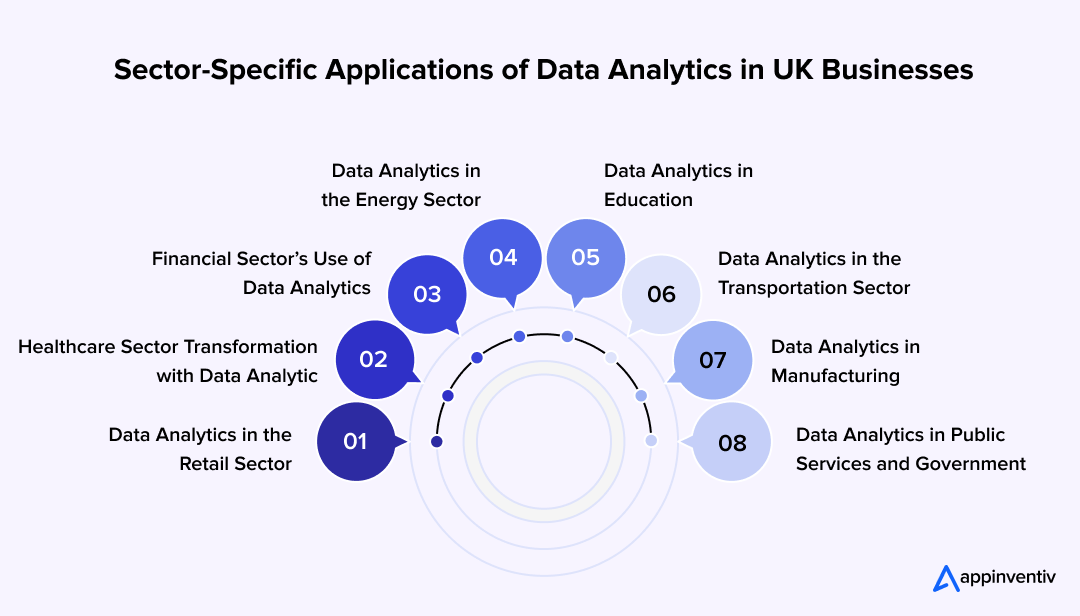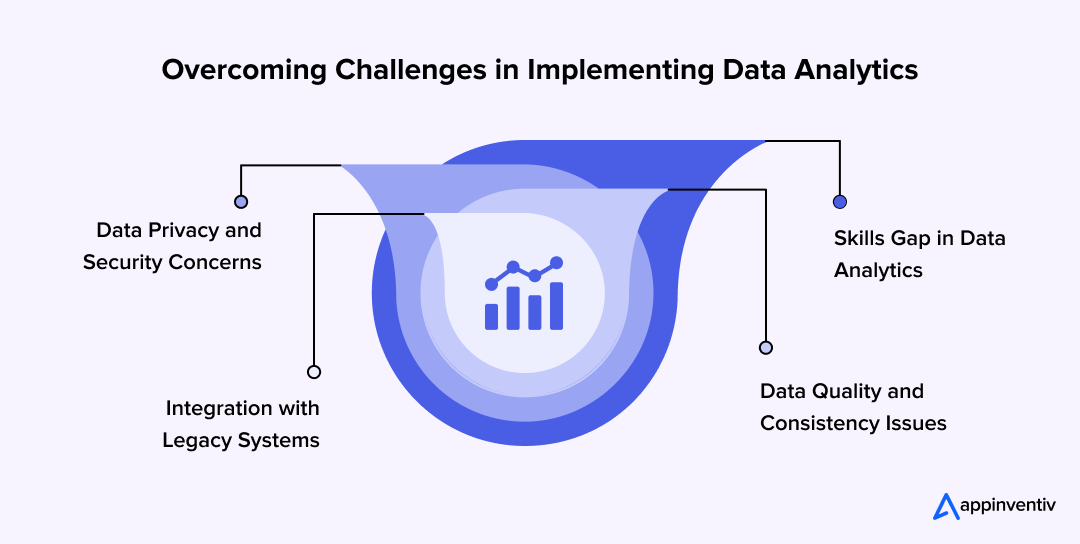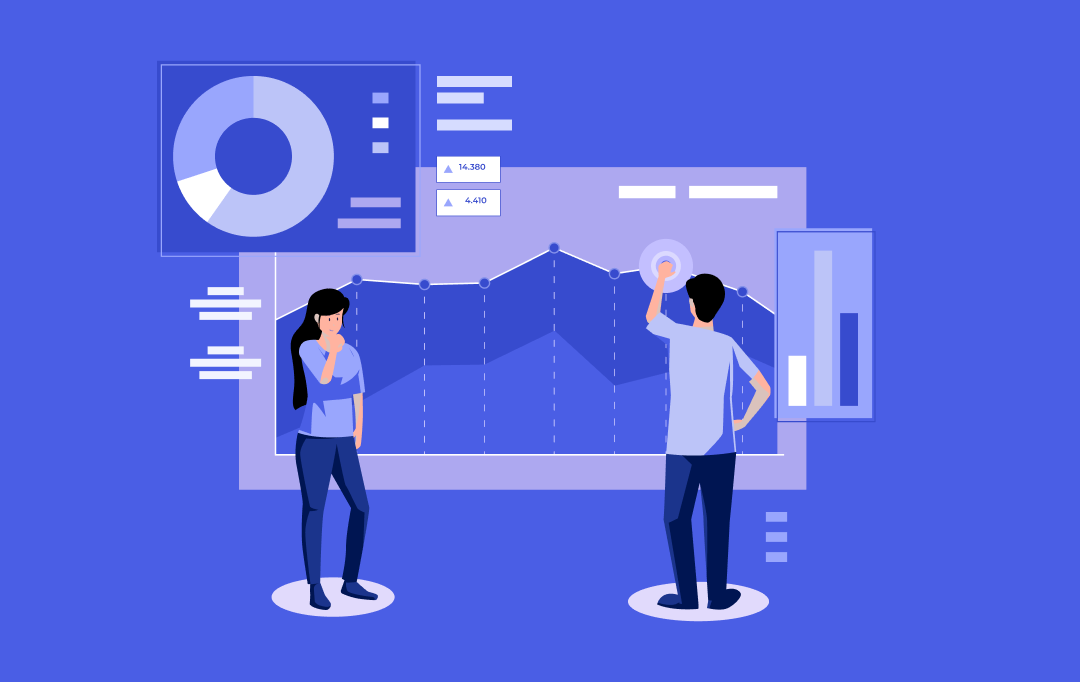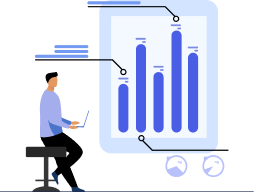- Why Data Analytics Matters for UK Businesses?
- Sectoral and Geographic Distribution
- Sector-Specific Applications of Data Analytics in UK Businesses
- 1. Data Analytics in the Retail Sector
- 2. Healthcare Sector Transformation with Data Analytics
- 3. Financial Sector’s Use of Data Analytics
- 4. Data Analytics in the Energy Sector
- 5. Data Analytics in Education
- 6. Data Analytics in the Transportation Sector
- 7. Data Analytics in Manufacturing
- 8. Data Analytics in Public Services and Government
- Emerging Technologies Enhancing Data Analytics in UK Businesses
- AI and Machine Learning in UK Data Analytics
- How IoT Changed Data Collection
- Augmented Analytics: Data for Everyone
- Detailed Challenges and Solutions Facing UK Businesses Adopting Data Analytics
- Data Privacy and Security Concerns
- Skills Gap in Data Analytics
- Integration with Legacy Systems
- Data Quality and Consistency Issues
- The Future of Data Analytics in UK Business
- How Appinventiv Helps You Leverage Data Analytics in UK Businesses
- FAQs
Key Takeaways
- Data has moved from support to strategy. UK companies no longer treat analytics as an add-on; it’s shaping how they forecast demand, design products, and compete for customers.
- Every sector is finding its own rhythm. From retail and healthcare to energy and education, organizations are using data differently, but the goal is the same: faster, smarter decisions.
- AI and IoT are amplifying analytics. Predictive models and connected systems now enable businesses to act in real time, turning insights into immediate operational change.
- Challenges remain behind the progress. Legacy systems, skill shortages, and strict data-governance rules still slow many UK firms, but those who invest in modern frameworks are pulling ahead.
- Analytics maturity defines the next decade. By 2030, the gap between data-driven leaders and late adopters will be hard to close, making analytics not just a growth tool but a survival strategy.
Data has become business infrastructure in the UK. Companies that dismissed data analytics in the UK five years ago are now playing catch-up. The UK businesses that invested early in data analytics have advantages that competitors can see but struggle to match.
The market is expected to reach USD 16.9 billion by 2030, underscoring the growing impact of data analytics in UK businesses. What matters more than that figure is that enterprises across sectors now recognize how data-driven decision-making directly affects market position.
Implementation varies by industry. Retailers personalize shopping using predictive analytics in UK models. Healthcare providers enhance diagnostic accuracy, while financial services leverage data analytics tools to improve investment and risk decisions. The common thread? Organizations that apply data analytics in the UK aren’t just improving operations; they anticipate market shifts and customer needs before competitors do.
Practical benefits are clear: faster decisions, reduced costs, and stronger customer relationships, driven by data governance frameworks and data visualization tools. Companies using data analytics in UK business models with real-time capabilities act faster, and timing now defines competitive advantage across industries.
This blog explores how data analytics is transforming UK businesses in real terms, covering real-world implementations, current technologies in use, the challenges companies face during rollout, and what’s actually working based on real case insights.
Explore how Appinventiv helps UK businesses build intelligent, analytics-driven ecosystems that translate complex data into measurable growth.
Why Data Analytics Matters for UK Businesses?
Data analytics in the UK has evolved from a specialized IT function into a strategic necessity. Today, leading companies place analytics at the heart of operations, driving smarter decisions, innovation, and sustainable growth.
Look at the market size. Data analytics in the UK reached USD 4.67 billion in 2024 and is projected to hit USD 16.97 billion by 2030 (Grand View Research). That’s rapid transformation supported by strong UK business analytics trends.
Major investments, such as Amazon Web Services’ USD 8 billion commitment to data centers, are driving data analytics adoption across UK sectors, improving both accessibility and infrastructure, according to DatacenterDynamics. These moves signal that data analytics for UK businesses has shifted from “optional” to “essential.”
The integration of AI and machine learning continues to expand what’s possible. More sophisticated analysis, better predictions, faster decisions, these technologies enable capabilities that traditional analytics approaches simply couldn’t deliver.
Business intelligence used to mean generating reports about what happened last quarter. Now it’s predictive and prescriptive analytics influencing decisions as they’re being made. Organizations that have figured this out are noticeably outperforming competitors who are still working on basic analytics capabilities.
Today, data analytics in UK businesses isn’t just about numbers. It’s about clarity, accuracy, and foresight. Advanced data visualization tools in the UK make insights accessible, while data governance frameworks ensure integrity. As analytics maturity in British companies grows, so does their ability to embrace true data-driven decision-making, enabling smarter, faster, and more sustainable business choices across sectors.
Sectoral and Geographic Distribution
Data-driven companies now shape the UK economy well beyond the tech sector. ICT remains the largest concentration, but 35–45% of these companies operate elsewhere, particularly in professional services, consultancy, marketing, and administration.
Roughly one in four data-driven companies falls under the professional services category. This shows that analytics has become fundamental to business operations, not just IT departments.
Geographically, London dominates heavily. One in three data-driven companies is based there, compared to just one in five UK businesses overall. That’s a significant concentration.
The South East and East of England follow London, forming what people call a “data corridor”, with advanced infrastructure and skilled talent concentrated in connected regions. Beyond these areas, Manchester, Leeds, and Edinburgh are growing into regional data hubs. The North East, Wales, and Northern Ireland currently show lower density, indicating growth potential remains there.
At the local level, the City of London, Westminster, Camden, Islington, and Hackney lead in the number of data companies. Larger firms mostly cluster in London and the South East. Smaller, more diversified analytics businesses do better in the Midlands and Scotland.
What this geography shows: data analytics has spread across UK regions and sectors. It’s now driving business decisions nationwide, rather than concentrated in a few locations as it was five years ago. Analytics has become a genuine growth engine across the country, though distribution remains uneven.
Sector-Specific Applications of Data Analytics in UK Businesses
Data analytics has shifted from a back-office function to an operational necessity across UK industries. The growing impact of data analytics in UK business is evident across all major sectors. From retail and healthcare to energy and manufacturing, data analytics in UK businesses now rely on data-driven decision-making to refine processes, cut inefficiencies, and boost customer satisfaction.
Let’s see how data analytics in the UK is being applied in specific sectors:
1. Data Analytics in the Retail Sector
Retailers in the UK now depend on predictive analytics to track purchasing patterns, shopping frequency, and the factors that drive buying decisions. Stock adjusts based on what’s actually selling, not what buyers predicted months ago.
For example, Marks & Spencer expanded its AI-driven capabilities across clothing and home categories, utilizing real-time feedback and customer data to enhance product development and marketing strategies. It uses data analytics tools to monitor what sells and adjust inventory in real time. When something starts moving fast, the system ensures it stays available. Their marketing sends different promotions to different customers based on what each customer actually buys, not on demographic guesswork. Sales numbers and loyalty metrics both improved after implementation. This approach reflects how data analytics adoption in UK sectors enhances operational precision and customer loyalty.
Read more: Boost Retail Inventory Optimization with Data Analytics.
2. Healthcare Sector Transformation with Data Analytics
Hospitals face a persistent problem: patient volumes fluctuate unpredictably, but staff and resources stay relatively fixed. Analytics addresses this by forecasting patterns and helping optimize staffing before crises hit. Hospitals in the UK are now embracing data analytics to deliver better care.
For example, Great Ormond Street Hospital’s AI strategy for 2025–2028 outlines initiatives to optimize non-clinical workflows and enhance clinical decision-making through AI technologies.
It leverages data analytics to forecast patient flow and improve diagnostics. This lets them staff appropriately, rather than scrambling when emergency rooms suddenly fill up. They’ve implemented diagnostic tools that compare current patient symptoms and test results with thousands of previous cases, improving both diagnostic accuracy and treatment outcomes. Data-backed insights are also improving clinical decisions, underscoring the importance of data analytics for UK healthcare enterprises.
3. Financial Sector’s Use of Data Analytics
In finance, the impact of data analytics in UK business is most visible in risk management, fraud prevention, and investment forecasting. Banks process millions of transactions daily. Finding fraud within that volume used to be nearly impossible until it was too late. Now analytics monitors transactions continuously, flagging suspicious activity within seconds.
For Example, in July 2025, Barclays and FICO received the Credit Award for Excellence in Fraud Prevention for their innovative use of AI in detecting fraudulent transactions.
It uses advanced data analytics tools used by UK businesses to detect fraud in real-time and refine credit scoring. It examines transaction patterns in real-time. They analyze financial data to improve credit risk models, which directly affects who gets loans and at what rates. With the help of data visualization tools in the UK, financial institutions can interpret transaction patterns faster and make data-driven lending and investment decisions. These initiatives reflect UK business analytics trends that prioritize customer safety and financial transparency.
Also Read: How Data Analytics Works in FinTech Enterprises?
4. Data Analytics in the Energy Sector
Energy companies balance a constant equation: supply must match demand precisely. Overproduce and you waste resources. Underproduce and you get blackouts. Analytics forecasts consumption and adjusts production accordingly. The energy sector showcases how UK businesses are using data analytics to improve sustainability.
National Grid’s 2025 report on peak load forecasting highlights the integration of predictive analytics to manage electricity demand across the UK.
National Grid forecasts electricity demand across Britain and optimizes distribution to match. Continuous monitoring of consumption lets them adjust production in real time. This matters especially with renewables like wind and solar, which produce variable output depending on the weather. Such applications highlight a growing data strategy for UK firms focused on sustainable operations.
5. Data Analytics in Education
Universities struggle to identify which students need help before they fail. By then, it’s often too late. Analytics tracks performance and flags concerning patterns early. Universities like University College London are leading in data analytics in the UK.
UCL’s data and insights initiatives from 2025 focus on using data analytics to improve student engagement and academic outcomes.
University College London monitors student performance and provides personalized feedback based on individual patterns. System alerts advisors who can intervene before the student falls too far behind. Administrators use data governance in UK companies’ models to ensure compliance and privacy while improving educational outcomes. This underlines the importance of data analytics for UK enterprises even beyond traditional business sectors.
6. Data Analytics in the Transportation Sector
Transport for London (TfL) uses data analytics in the UK to optimize public transport. Transport networks constantly optimize: routes that minimize travel time, schedules that match demand, and maintenance that prevents breakdowns without excessive downtime.
For example, Transport for London’s 2025 quarterly performance report discusses the implementation of AI technologies to enhance service efficiency and reduce congestion.
Transport for London runs real-time analytics across buses, trains, and the Underground. They monitor traffic, adjust schedules to minimize delays, and analyze where congestion happens repeatedly. When certain routes consistently show problems, data informs whether to increase service frequency or modify routes entirely.
7. Data Analytics in Manufacturing
Equipment failure in manufacturing is expensive and disruptive. Unplanned downtime derails production schedules and delivery commitments. Analytics enables predicting failures before they happen.
For example: Rolls-Royce’s 2025 investment in digital services includes AI-powered predictive maintenance solutions for its Trent engine series.
Rolls-Royce continuously monitors aircraft engines using sensors that feed performance data into analytics systems. Tracking patterns lets them predict component failures and schedule maintenance proactively. This prevents unplanned shutdowns that cost far more. The same approach identifies production inefficiencies before they significantly impact operations. This is a strong example of analytics maturity in British companies, where data fuels reliability and performance in the manufacturing sector.
Also Read: Big Data in Manufacturing – Importance and Use Cases
8. Data Analytics in Public Services and Government
The future of data analytics in the UK public sector is already unfolding. Government agencies allocate limited budgets across competing priorities. Analytics shows where resources deliver the most impact based on actual results, not assumptions.
For example, the NHS’s plans for a £180 million framework for AI diagnostics and predictive analytics, announced in January 2025, aim to enhance patient care through advanced data analytics.
The NHS in the UK uses predictive analytics to anticipate patient demand and reduce wait times. Analyzing healthcare data patterns reveals bottlenecks, helping reduce waiting times and allocate resources more effectively. During winter, when flu cases spike, predictive models ensure adequate staffing before demand overwhelms capacity. Local councils in the UK use data analytics to guide urban planning, optimize resource allocation, and improve service delivery. Effective data governance frameworks keep citizen data secure while enabling smarter, evidence-based policymaking.

Whether you’re in retail, finance, healthcare, or public services, Appinventiv helps UK enterprises turn analytics into action.
Emerging Technologies Enhancing Data Analytics in UK Businesses
Emerging technologies are amplifying the impact of data analytics in UK business, helping organizations transition from descriptive to prescriptive models. Here’s how the next generation of tools is reshaping data analytics in UK businesses:
AI and Machine Learning in UK Data Analytics
The impact of AI on UK businesses has become hard to ignore. Artificial Intelligence (AI) and Machine Learning are at the core of modern UK business analytics trends. Retailers are tailoring experiences to individual customers at scales that weren’t possible before. Banks are spotting fraud as it happens rather than discovering it in weekly audits. Investment firms are completing analyses that used to tie up entire teams for days.
The interesting part isn’t just that things happen faster. These systems improve themselves. A model analyzing customer behavior today will be noticeably better at it in six months without any manual refinement. You don’t need to keep hiring more analysts to maintain that improvement; it just continues. Machine learning also improves data quality and consistency by automatically identifying errors and anomalies, driving a smarter data strategy for UK firms.
Companies investing in this now are building leads that’ll be tough for others to close later.
How IoT Changed Data Collection
IoT shifted how UK businesses collect operational information. IoT in Manufacturing plants uses sensors that flag equipment issues before they cause breakdowns. You’re fixing problems before production stops, not after you’ve already lost hours and revenue.
Logistics firms track shipments constantly now. When delays occur, they reroute immediately instead of waiting to discover the problem at the next checkpoint. Real-time visibility means real-time responses. The bottom line? Operations run leaner. Machines stay functional longer. Trucks don’t make pointless trips. Stock goes where demand actually is. All of this cuts costs directly.
IoT also strengthens data governance in UK companies by ensuring data traceability and accountability.
Augmented Analytics: Data for Everyone
Here’s the problem traditional analytics had: only technical people could use the tools effectively. Everyone else submitted requests and waited. Often for days. So plenty of decisions got made on instinct because pulling the actual numbers would take too long.
Augmented analytics changed that equation. Non-technical managers can now type questions in normal English and get visual answers immediately. The technical complexity, data cleaning, running analyses, and creating charts happen automatically in the background.
This matters because decisions happen faster. When market conditions change or problems emerge, managers can check the data immediately rather than join a queue. Organizations respond to situations while they’re still developing, not after they’ve already caused issues.
Does it work perfectly? No. You still need people who understand your business well enough to interpret what the data’s actually saying. But it cleared a major roadblock that’s been slowing companies down for years. Augmented analytics represents the future of data analytics in the UK public sector and private industries alike.
Also Read: Augmented Reality for Business: Use Cases and Benefits
Detailed Challenges and Solutions Facing UK Businesses Adopting Data Analytics
Even with the rapid adoption of data analytics across UK sectors, challenges persist, including data security concerns and skill gaps. However, by adopting the right strategies and solutions, businesses can effectively overcome these barriers and unlock the full potential of data.

Data Privacy and Security Concerns
Strict regulations, such as GDPR, require robust data governance in UK companies. GDPR changed everything for UK businesses using analytics. The penalties for getting it wrong aren’t just expensive; they’re company-ending for smaller organizations. And the reputational damage? That takes years to rebuild, if rebuilding is even possible.
The challenge most organizations face isn’t theoretical. They need customer data to compete, but every dataset can become a liability if not protected properly. That tension creates real hesitation in analytics adoption.
Solution: Security and encryption need to be built into the foundation, not added after implementation. UK retailers run security audits every quarter, specifically on their analytics systems. That investment consistently costs less than the cost of GDPR violations.
Privacy-by-design means thinking about data protection from the start, not scrambling to fix vulnerabilities after launch. Organizations getting this right treat compliance as an architectural requirement, not a checklist exercise.
This is why AI governance is a major concern when hiring AI developers in the UK.
Skills Gap in Data Analytics
The shortage of data skills remains one of the biggest challenges for UK businesses. Finding people who can interpret analytics and make business decisions from them keeps causing problems. The talent shortage has gotten worse over the past two years.
Here’s what keeps happening: companies invest in analytics platforms, staff attend training, then the system sits there generating dashboards nobody acts on. The technology works fine, but people just don’t understand what the data means for their actual decisions.
Solution: Training current employees often works better than hiring analytics specialists. Your staff already knows your business, customers, and operational challenges. Teaching them analytics proves easier than teaching analytics experts your business from scratch.
A London retail company spent four months searching for a senior analyst. Didn’t find anyone- every qualified candidate had multiple offers. They trained three existing managers instead. Two months later, those managers were using analytics effectively because they already knew which business problems mattered.
University partnerships help in the long term, but “long-term” means years. For immediate needs, bring in consultants who train your team while doing the work. You’re building internal capability, not just buying analysis.
This approach delivers results in weeks. Finding the right analytics hire in London can take six months or more.
Integration with Legacy Systems
Most established UK businesses run on systems built in the 2000s or earlier. These systems weren’t designed to work with modern analytics tools. The data lives in incompatible formats. The APIs are outdated or don’t exist at all. Making everything communicate with everything else becomes expensive and slow.
Some organizations spend half a year just getting a reliable data flow between their new analytics platform and existing operational systems. That delay frustrates everyone waiting to see a return on the investment.
Solution: Trying to integrate everything at once rarely succeeds. The organizations that handle this well start with one or two core systems, validate that the integration actually works, and then expand methodically.
Cloud-based data analytics solutions in the UK now bridge these gaps, enabling gradual upgrades without business disruption. They can connect to older systems through middleware without requiring a complete infrastructure replacement. It’s a realistic way to scale data-driven decision-making and achieve true digital transformation.
Data Quality and Consistency Issues
Analytics built on unreliable data produce unreliable insights. That sounds obvious, but it’s a problem many organizations discover only after making costly decisions based on flawed analysis.
Solution: Regular data cleaning isn’t glamorous work, but it’s necessary. Clear governance protocols matter, who enters data, how they enter it, what standards they follow, and who checks accuracy.
AI-powered data management tools can automatically flag anomalies and standardize formats, helping maintain consistency. But human oversight remains essential. The tools need people to ensure they’re working correctly.
Fix data quality problems before implementing sophisticated analytics. Otherwise, the organization gets precise-looking answers that are fundamentally wrong, an expensive mistake that undermines trust in analytics entirely.
Companies are investing in data governance frameworks that prioritize accuracy, automation, and transparency. This ensures the impact of data analytics in UK business remains measurable and meaningful.
Transform your business with secure, scalable analytics solutions.
The Future of Data Analytics in UK Business
The future of data analytics in the UK is advancing fast, with AI, machine learning, and real-time systems reshaping how organizations operate. Companies adopting predictive analytics tools and data governance frameworks in the UK will lead the way in the next decade, while those that lag behind risk falling out of step with evolving UK business analytics trends. The next few years will transform the maturity of analytics in British companies.
Here’s where it’s heading:
- AI & Machine Learning Integration: The next wave of data analytics in the UK will be powered by AI and ML integration. These technologies are moving from specialized tools to standard operations. Automation will expand beyond current levels, but getting there remains difficult for most companies.
- Augmented Analytics: By 2030, UK businesses will rely on it, enabling department heads and marketing directors to access insights directly. While tools are becoming easier to use, adoption still takes time.
- Industry Adoption: Retail, healthcare, finance, and manufacturing are leading sectors in data analytics adoption in the UK, using data to fuel innovation, efficiency, and personalized experiences. How well they work depends heavily on whether analytics actually influences daily operations or just generates reports nobody reads.
- Shift in Operational Practices: Transitioning to real-time analytics requires infrastructure updates, process redesigns, and new skills—challenges many underestimate.
- Strategic Investment: Success in data analytics comes from combined investments in technology, talent, and infrastructure —not sequentially, but in tandem.
- The Road to Success: Treating data analytics as a strategic enabler, not just an IT initiative, will position UK businesses for long-term success.
How Appinventiv Helps You Leverage Data Analytics in UK Businesses
Appinventiv helps enterprises transform raw data into actionable intelligence through advanced data analytics services. We combine predictive analytics, AI, and machine learning with secure data governance frameworks to ensure compliance, scalability, and measurable business impact.
We don’t build generic dashboards. Each data ecosystem is designed around specific operational problems, using AI, machine learning, IoT, and cloud platforms to solve them. Retail needs different analytics than healthcare. Finance faces different challenges than logistics. Manufacturing requires capabilities that don’t apply elsewhere.
When a global telecom giant faced siloed data challenges, we built a unified analytics platform that achieved 100% data availability and 26% lower infrastructure costs. Similarly, for Sonny’s Enterprises, we built an AI-driven operational analytics solution that enabled predictive maintenance and improved real-time visibility.
Technology means nothing without business results. Analytics work targets specific outcomes: better personalization, automated operations, reduced waste, and accurate demand forecasting.
Our app development in the UK ecosystem ensures every digital product we deliver is built with embedded analytics, GDPR compliance, and scalability at its core.
Whether you’re modernizing legacy systems, refining data governance in UK companies, or building an enterprise-wide data strategy for UK firms, our experts can help you move from insight to impact. Connect with us Today!
FAQs
Q. How is data analytics shaping the future of UK businesses?
A. The impact of data analytics in UK business is redefining operations across industries. Companies in the UK are using predictive analytics to anticipate market shifts, automate decision-making, and improve customer experiences. From retail to healthcare, UK businesses now rely on real-time insights and data governance frameworks to gain a competitive edge.
Q. What sectors in the UK are using data analytics the most?
A. The sectors leading data analytics adoption in the UK include retail, healthcare, finance, manufacturing, energy, and the UK public sector. Each industry uses data analytics in the UK differently; retail focuses on personalization, finance on fraud prevention, and healthcare on improved patient care, all contributing to stronger data-driven decision-making across the economy.
Q. How are UK SMEs leveraging data analytics?
A. SMEs are embracing data analytics on UK businesses’ platforms to strengthen forecasting, supply chain management, and marketing strategies. By using data visualization tools and affordable cloud-based solutions, small and medium-sized firms can now apply predictive analytics techniques that were once limited to large enterprises.
Q. What are the challenges of implementing data analytics in UK companies?
A. The biggest challenges include poor data quality and consistency, legacy system integration, and the ongoing data skills shortage in the UK. Many firms also struggle to build secure data governance frameworks that meet GDPR requirements. Overcoming these requires a clear data strategy for UK firms that combines skilled talent, modern tools, and structured data management.
Q. What tools and platforms are popular for data analytics in the UK?
A. Popular data analytics tools used by UK businesses include Power BI, Tableau, AWS Redshift, and Snowflake. These solutions support data-driven decision-making, real-time dashboards, and interactive reports, helping UK companies manage data effectively while maintaining data governance.
Q. How does regulation (like GDPR) affect data analytics in UK industries?
A. Regulations like GDPR significantly shape data analytics in UK businesses by mandating transparent data usage and customer privacy. Companies are building data governance frameworks and adopting privacy-by-design approaches to ensure compliance, making data governance in UK companies both a legal and ethical necessity.
Q. How big is the data analytics market in the UK?
A. According to Grand View Research, the data analytics UK market was valued at USD 4.67 billion in 2024 and is projected to reach USD 16.97 billion by 2030, highlighting how fast UK business analytics trends are evolving and how vital data strategy for UK firms has become for competitiveness.


- In just 2 mins you will get a response
- Your idea is 100% protected by our Non Disclosure Agreement.

How to Hire Data Engineers for Your Enterprise? All You Need to Know
Key takeaways: Hiring data engineers individually slows execution and increases delivery risk at enterprise scale. Partnerships give faster access to senior talent without long recruitment cycles or retention issues. Cost depends more on capability and responsibility than salary alone. The right hiring model directly affects business speed, stability, and ROI. Partnering with experienced teams converts…

Is Your Business Model Compliant with the EU Data Act? A Checklist for C-Suite Executives
Data has quietly become the backbone of modern business. Whether it’s a retailer predicting what you’ll buy next week or a car maker tracking vehicle performance in real time, every decision today leans on streams of information. But with that power comes a tough question: who really owns the data, and who gets to use…

Demystifying Lending Analytics – Benefits, Features, Process, Costs
Key Takeaways Benefits: Faster approvals, clearer risk visibility, less manual work, built-in compliance, and a better experience for borrowers. Use Cases: Credit scoring, fraud detection, SME and microfinance inclusion, mortgage monitoring, stress testing, and cross-sell opportunities. Features: Real-time data, predictive and prescriptive models, explainable decisions, cloud scalability, strong security, and reliable governance. Implementation Steps: Spot…





































